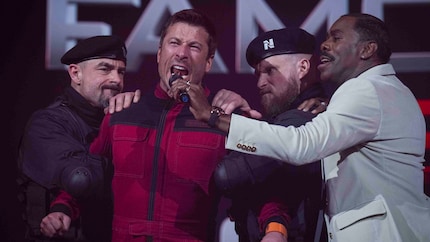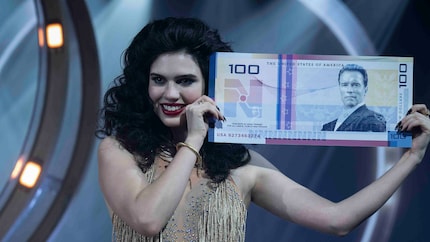
News + Trends
Zurich presents first AI actress - Hollywood reacts in horror
by Luca Fontana

Edgar Wright’s remake of The Running Man is brilliantly made, but frighteningly harmless. It intends to warn us, but entertains us instead.
Don’t worry, this movie review contains no spoilers. I won’t reveal more than the trailers do. The Running Man’s now showing in cinemas in Switzerland. We talk about the movie from minute 51:47 in our Swiss-German podcast A Tech Affair.
The lights come back on, the screen goes black. I stay in my seat. My head’s buzzing. My thoughts sway between mild amusement and indifference. I’ve just spent two hours in Edgar Wright’s dystopian future that feels familiar – too familiar.
Outside, in the cinema foyer, journalists are back to reality, scrolling through feeds, laughing, posting. Inside, the film lingers – a film that was meant to scare us, but didn’t. Why? Because the world it depicts is no longer alarming. It’s our reality. What we experience every day.
So where did this movie go wrong? Well, when Stephen King wrote The Running Man under his pseudonym Richard Bachman and published it in 1982, he didn’t want to create a spectacle, but rather a warning in the guise of an exaggerated dystopia about poverty, control and a version of America that no longer feeds its citizens, but exploits them.
In the book, the story is set – prophetically – in the year 2025. Society has collapsed, the rich have separated from the impoverished masses, and television has become a weapon. People no longer compete in game shows for fame, but for survival. After all, if you’re desperate enough, you’ll even let yourself be lured into a deadly game show where you’re chased by hunters. You’ll risk dying, only to have the chance to win the billion-dollar prize money for your family.

Stephen King wasn’t interested in showing futuristic gimmicks, but social anger. The Running Man was his answer to the neoliberal coldness of the 1980s. A response to entertainment that numbs people, and to a world in which people watch their own humiliation live on television – and even celebrate it.
Five years later, in 1987, the first film adaptation was released, starring Arnold Schwarzenegger in a look so glaring that it almost seems parodic today. Instead of gloom and poverty, neon colours, lycra costumes and one liners dominated the movie. The anger and criticism of capitalism from King’s original gave way to a 1980s action spectacle that transformed its own criticism of the public’s lust for violence into pyrotechnics.
And yet, underneath the trashy surface, the original idea kept coming through. For example, when the show audience cheers while people are dying or when TV becomes a weapon of lies and truth is distorted in the editing room. The Running Man from 1987 wasn’t a bad movie, but it didn’t commit to either criticising the system or entertaining viewers. In the end, it degenerated into a satire that inadvertently became part of the spectacle itself.
While the 1987 film version is set in 2017, Edgar Wright’s new adaptation is set in 2025 – the same year in which King’s novel takes place. A coincidence? Maybe, but a darn symbolic one. What director Edgar Wright tried to do, more than forty years after King’s novel, was to take The Running Man back to its dark roots. But he failed because he does what he’s so good at.
The movie gets off to a furious start. Edgar Wright shows America on the brink of collapse. A country that kills the poor for the pleasure of the rich. Glenn Powell plays Ben Richards, a man who’s done nothing wrong except show backbone. But this is enough for him to lose his job, his livelihood and any prospects of a better future. His daughter’s ill, his wife’s desperate – and the system couldn’t care less.
The first hour of the movie is filled with anger. It’s tangible, palpable, almost physical. Wright doesn’t show glossy Sci-Fi, but a social dystopia: grey streets, cheap advertising, people who kill each other in game shows just to win a few Neo Dollars – that’s dollars that ironically have Arnold Schwarzenegger’s face emblazoned on them.
When Richards hears about the show for the first time, his reaction is like ours: «I’m not stupid enough to take part in that.» But the more urgent his family’s need becomes, the more plausible the idea of signing up for the suicidal spectacle becomes. The writing’s great, so is the acting, and it’s indeed close to the moral toughness of King’s novel.
Glenn Powell carries this first hour with an energy that I wouldn’t have believed him capable of. His Richards isn’t the cool hero Schwarzenegger depicted, but a man in the stranglehold of a system that doesn’t know empathy. In these moments, The Running Man is great: angry, cynical, but frighteningly plausible. For a moment, you think Edgar Wright really rediscovered Stephen King’s anger.
But at some point, the movie loses control of this anger. What begins as a gloomy social analysis becomes louder and louder as the film progresses and eventually turns into a comedy that can’t decide whether it wants to hurt or entertain us.
From the second half on, The Running Man tips over into classic Edgar Wright mode, featuring on-point dialogue, visual irony and quirky supporting characters. The problem? That’s usually his greatest strength, but it just doesn’t fit this movie. The vein of anger that gave the movie its punch at the beginning becomes a caricature. Glenn Powell, driven by rage and despair at the start of the movie, suddenly starts making corny jokes. The pain you felt from him becomes a farce.

The movie’s visuals also get weaker. It starts off with dirt and darkness, then becomes more and more comic-like. The show itself, this grotesque television circus, becomes an end in itself: an action spectacle intoxicated by its own absurdity.
Of course, this is somewhat intentional. The criticism of media stultification was always part of the material. But Wright takes it so far that it loses its punch. The very thing that’s usually his trademark – balancing humour, drama and action – collapses.
The story Edgar Wright tells us is intended as a warning. But it comes too late. The future he depicts has long become our reality and the media manipulation the film denounces is happening today in real time – in our feeds, on our screens, smartphones and tablets.
When Wright, for instance, shows how fake videos and AI-generated soundtracks control public opinion, it’s supposed to be a dystopian mind game. But in today’s world, this is a reality. We don’t need a totalitarian regime to distort reality today. An algorithm is enough. A deepfake. A viral clip that’s shared hundreds of thousands of times before anyone realises it’s not real.
We live in a world with virtual actresses such as Tilly Norwood, who don’t actually exist, but signs advertising deals. A world in which Matthew McConaughey licences his voice to AI systems so that he can also produce his podcast in Spanish. And a world in which TikTok serves us absurd, AI-generated fantasies on a daily basis. Yetis that make vlogs, cats that shoot bazookas, jackets that tap beer.
All this is no longer a dystopia. It’s our everyday life: the digital background noise of a humanity that’s long since abandoned the distinction between fiction and reality. And this is probably the real problem with The Running Man – the bleak future it presents is already our reality. Which begs the question:
What’s the point of this remake?

In my opinion, we didn’t need this remake. At least not in this shape and form. To be relevant, Wright’s The Running Man should’ve been more radical. More honest. Angrier. And above all more resolute. Especially towards the end. A movie that doesn’t only remind us of what we already know, but forces us to think about it. Instead, in the second half, it’s more like an over-the-top 1980s version that pays homage to the trash that King once despised.
The Running Man didn’t leave me feeling shaken, but pleasantly entertained. Which is an ironic and unintentional triumph. I’m pretty sure Wright meant to create a movie that sets off my inner alarm bells, not one that makes me laugh.
Maybe the greatest paradox of Edgar Wright’s The Running Man is that it warns us about a world that’s already a reality, yet somehow manages to make it look appealing.
From a cinematic point of view, this is a brilliant movie. Camera work, editing and sound design are all flawless. And Glenn Powell carries the film with incredible and surprising energy. But in the end, all this precision and style are lost. Why? The film works too well as an entertaining and even humorous spectacle to shake us the way Stephen King once intended.
What remains is a work that’s enjoyable, but not moving. Two hours of entertainment without alarming us. Or even hurting us. We’ve simply become too numb. Perhaps that’s the most frightening thing about this movie.
I write about technology as if it were cinema, and about films as if they were real life. Between bits and blockbusters, I’m after stories that move people, not just generate clicks. And yes – sometimes I listen to film scores louder than I probably should.
Which films, shows, books, games or board games are genuinely great? Recommendations from our personal experience.
Show all